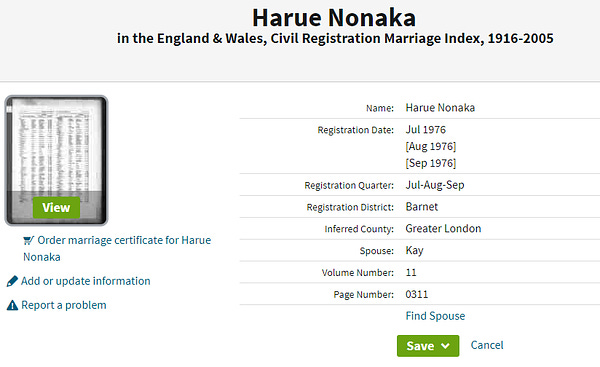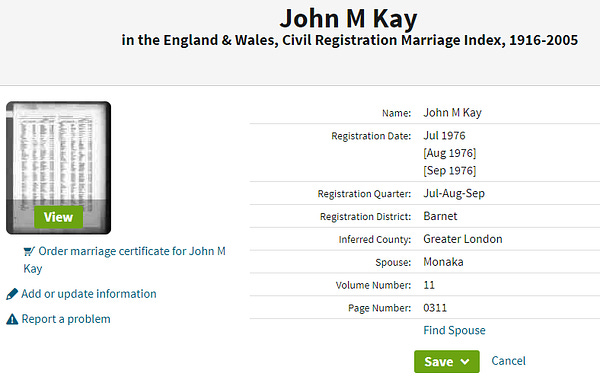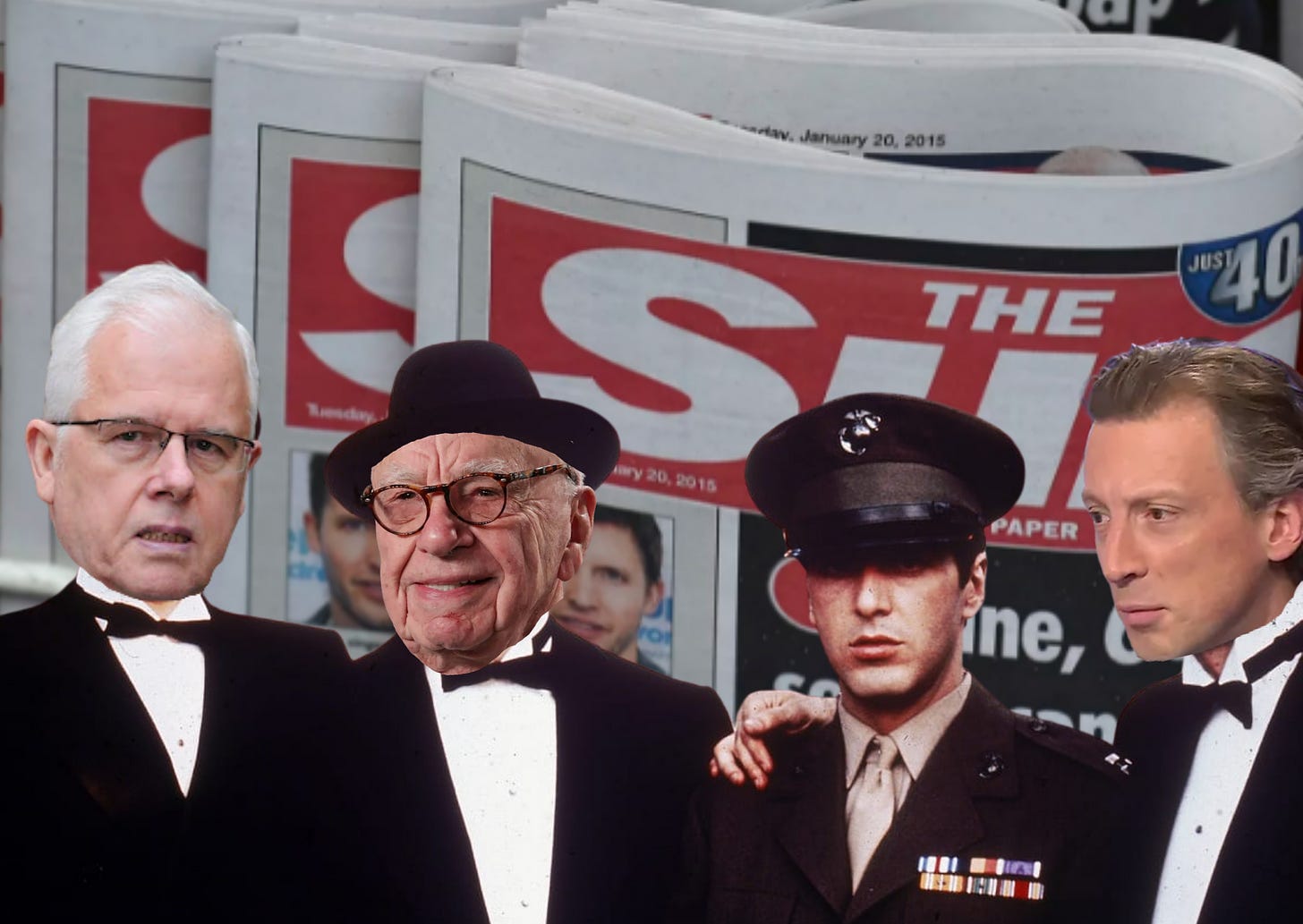Hey! Look over Keir! His mentor was a killer but Tom Newton Dunn wants to talk about Starmer...
Warning: This newsletter contains the former Sun hack and current Times Radio stooge claiming to be a "neutral observer".
Previously:
1. The Sun’s killer obit: Fleet Street’s most hypocritical paper spins its former chief reporter’s ‘legendary’ career
2. Scoop! The excuses journalists make for our profession's crimes are vile...
John Kay killed his first wife Harue. It is a fact that must be repeated because his mendacious mourners on Fleet Street are so insistent on erasing her memory in favour of adjective-laden encomiums about his scoops and what a good chap he was during the long lunches they had with him.
The reports that mention Harue aren’t even clear if she was 27 or 33. None of them give her maiden name, which Nick Blair — after reading the last edition on the case — has narrowed down to either Nonaka or Monaka, with the former more likely to be correct. Even the official record of Harue’s marriage to Kay seems to include a typo.



But how does Tom Newton-Dunn, who describes Kay as his mentor, refer to the events in 1977 when Kay, apparently distressed at his inability to report on the TUC conference, drowned his wife in the bath and attempted to take his own life in multiple ways? It’s all wrapped up in 11 words:
Johnners was also a very sensitive man with a troubled past.
Kay, represented in court by expensive QCs engaged by The Sun, plead guilty to manslaughter by reason of diminished responsibility. He spent time in a psychiatric hospital and was welcomed back into The Sun newsroom on the proviso that he remained in the office.


Tom Newton-Dunn doesn’t say Harue’s name or truthfully acknowledge the crime his mentor committed all those years ago because it’s a trial at the end of Kay’s time on The Sun that he’s interested in.
In 2012, John Kay was one of eight people arrested as part of the Operation Elveden investigation into payments to serving police officers and active civil servants. His source — Bettina Jordan-Barber, a Ministry of Defence employee — was jailed for 12 months in January 2015 for misconduct in public office. Kay was cleared in March 2015 and retired from The Sun later that year.
During the case, Kay’s defence was allowed to present character witnesses, but the prosecution was told it could not mention the killing of Harue Kay. As a reporter who was present during the trial told me:
… we had all these senior Fleet Street figures telling us what a great guy he was and how he was always law-abiding. The prosecution was fuming.
Extremely normal Sun royal photographer Arthur Edwards, who recently hid in a false pillar at the Duke of Edinburgh’s funeral — apparently at the posthumous request of the Prince — told the court:
I’m so proud to give evidence for John Kay. I’m just one of dozens at The Sun who would do the same. They would queue at the door. He’s done more for me than I have done for him which is why I’m here.
Dominic Ponsford, Editor of the Press Gazette, whose response to a previous edition of this newsletter can be read here, told jurors that Kay was considered a “straight dealing reporter” and continued:
My impression over the years is that he is someone who despite his high position always has time to help the younger journalist.
In 2005, Press Gazette named Kay as one of the “top 40 journalists of the modern era” and reported in its Axe Grinder column in 2008 that:
Chief reporter of The Sun John Kay is fast approaching retirement age - but Press Gazette understands he has been persuaded to stay on for at least another couple of years as a full-time freelance on the same pay.
Kay is regarded by many to be the best reporter on Fleet Street and has twice been named reporter of the year in the British Press Awards over the last decade.
He is also one of the 40 greatest national press journalists of the last 40 years to make it into the Press Gazette National Newspapers Hall of Fame.


Newton-Dunn’s Evening Standard piece is a continuation of this Fleet Street myth-making but it’s also an attempt at revenge. He begins:
This is a story about a tabloid journalist called John Kay. You may not have heard of him, but you’ll know the stories he broke. It’s also about Sir Keir Starmer, and how he broke John Kay…
… John Kay was The Sun’s Chief Reporter for 21 years. He was a Fleet Street legend for even longer, winning Reporter of the Year twice, a feat nobody else has managed. He broke some massive stories. Prince Edward quitting the Royal Marines, Roman Abramovich buying Chelsea, and publishing the entire “annus horribilis” Queen’s Christmas speech in advance to name three.
John’s theatrical routine, which I observed many times, went like this: he’d slam down his phone and loudly march up to the news desk to declare: “Right. I’ve got a Triple Belter. Where’s the editor?” Proud, and boastful at times, Johnners was also a very sensitive man with a troubled past. He was also kind to a fault. He mentored many young journalists, including me.
Legend is a funny word. The Minotaur is also a legend and most people don’t think chucking people in a maze to be murdered by a bull-man is worth celebrating. Notice how Newton-Dunn excuses boorish behaviour — “John’s theatrical routine” — just as he papers over the time his beloved mentor killed his wife and claimed there was a suicide pact.

The three “massive stories” that Newton-Dunn chooses as example’s of Kay’s brilliance also reveal how tedious and trivial tabloid concerns actually are. Not one of those ‘scoops’ is about “telling truth to power” as hacks love to boast about doing with very little evidence to back up their claims.
Prince Edward quitting the Royal Marines = someone told Kay something that was going to come out soon anyway and which was of only minor interest.
Roman Abramovich buying Chelsea = someone told Kay something that was going to come out soon anyway and was a one-fact story that was spiced up with the “Chelski” line which Kay didn’t even come up with himself.
… and publishing the entire Queen’s Christmas speech in advance = someone rang him up and played it down the phone to him and he recorded it.
Each of those stories boils down to the incredible power of a) being Chief Reporter at The Sun and b) having a cheque book you can open to pay for stories. There’s not an ounce of investigative skill or journalistic enquiry in those stories — it’s stenography with some shit Sun puns sprinkled through it.
But once the fluffing for his former mentor is over, Newton-Dunn gets to the real point of this ‘tribute’:
As Director of Public Prosecutions in 2012, Keir Starmer decided John and 32 other red top journalists should face criminal charges for paying public officials for information.
They were arrested in their homes in dawn raids, despite it being wholly unclear for months what the criminal offence was, and with none of them ever having any idea they had even committed one. All languished on police bail for three years, unable to work.
All bar one were eventually acquitted at the Old Bailey of conspiracy to commit misconduct in a public office - the offence, which dates back to the 13th century offence with which the CPS had finally charged them. And the one journalist who was convicted later quashed it on appeal.
There’s a whole lot of context stripped from that retelling of events.
Yes, Kay and The Sun’s former Royal Editor Duncan Larcombe were acquitted. They successfully argued — with Kay once again benefitting from the enormous resources of Rupert Murdoch’s empire — that their contact with military sources had been in the public interest.
But Operation Elveden — the codename for the police investigation into alleged corrupt payments — resulted in the conviction of 34 individuals. Sun crime reporter Anthony France’s conviction was quashed on appeal because the original trial judge’s directions to the jury were deemed insufficiently detailed.
Charges against The Sun’s Defence Editor, Virginia Wheeler, were dropped by the CPS on health grounds, but her source, a police officer called Paul Flattley, was jailed for two years for misconduct in public office. He’d made £7,600 from The Sun for stories including gossip about Paul Gascoigne, Zara Phillips, Jack Wilshere and details on the drug-related death of a 15-year-old girl.
I wrote in a previous edition of this newsletter that…
Many hacks come from the ‘facts don’t care about your feelings’ school of thinking until the person being criticised is them or one of their friends. At that point, they swiftly enrol at Madame Delicate’s Academy for the Emotionally Frail…
… and Tom Newton-Dunn got fully dolled up in his Madame Delicate’s uniform to write The Evening Standard column.
Starmer was the ultimate decision-maker at the CPS as Director of Public Prosecutions but he was not the only one making the decisions.
And the results of Operation Elveden suggest it was right that the investigations and trials took place. Whatever hacks might tell you, it’s not healthy for civil servants and police officers to be selling stories to tabloids.
That’s not whistle-blowing, it’s nest feathering. Nor are Sun journalists exempt from scrutiny by the criminal justice system for which they simp relentlessly until it turns its attention on them.


But that’s not how Tom Newton-Dunn sees things. He continues:
Why? Because there had been no crime. You may find paying for stories immoral (I don’t if it’s for the greater public good). But what is now without any doubt is it wasn’t criminal. As the Lord Chief Justice Lord Thomas put it, during a caustic later ruling against the CPS: “Did you at any point consider the freedom of the Press?”
John was a free man, but the horrendous ordeal had broken him. He never came back to work, and his health rapidly deteriorated.
Those five words — “… if it’s for the greater good” — tell you a lot about the arrogance and entitlement of the British tabloid press. It wants to decide what is and isn’t in the public interest and will always attempt to persuade you that anything the public finds interesting automatically qualifies.
Providing yet more evidence of his addiction to bad faith statements and severe allergy to context, Newton-Dunn goes on:
How did he ever find himself facing such a perverse predicament? The answer is political pressure. When the phone hacking scandal broke in 2011, then Labour leader Ed Miliband threw the kitchen sink at trying to bring down Rupert Murdoch’s News International.
How did the police come to discover that substantial payments had been made to serving officers by The Sun? Well, they were in documents that News UK sent to them. And it was Rupert Murdoch’s operation that both threw its journalists and their sources to the wolves and paid the bills to drag most of the hacks out of the mud. But Murdoch’s name doesn’t appear in Tom Newton-Dunn’s column because he’s a made-man in the Murdoch empire, handsomely rewarded for his service to The Sun with his cosy Times Radio job.
Another aspect of the Elveden trials that Newton-Dunn neglects to mention is the case of Clodagh Hartley, The Sun’s former Whitehall Editor, who was found not guilty of organising payments to a corrupt HMRC official in return for stories. During her trial, Newton-Dunn featured heavily in Hartley’s evidence.
She spoke of a poisonous atmosphere in The Sun’s Westminster team, claiming Newton-Dunn bullied her and stole credit for her work. She said he “succeeded in stealing contacts” from her and constantly demanded exclusive stories until she was forced to take time off to deal with the stress.
News UK responded to questions about Hartley’s evidence by saying:
We take staff welfare extremely seriously and adhere to the highest standards. Our processes are robust and whilst we do not discuss individual cases we are satisfied that the appropriate procedures were followed in this case and a suitable outcome achieved.
To which the only real response is a long and hollow laugh.
Court and politics reporter James Doleman has another perspective on Newton-Dunn and that trial:








It seems that Newton-Dunn has not recovered from his grudge-settling, revenge-seeking tendencies. Before bringing his Evening Standard column to a close by claiming that Keir Starmer is rubbish because something something Op Elveden and that John Kay was a Labour voter, he slips in this anecdote:
Just after he was elected to Parliament in 2015, two senior Sun executives offered Keir lunch in Westminster to suggest a truce. Starmer willingly agreed. It was suggested to him that he might like to apologise to the journalists whose lives he’d unlawfully turned upside down. Starmer said he would consider it. The apology never came.
Newton-Dunn assumes that little tidbit will make readers agree with him that Starmer is a rotter. But, while I am no fan nor ever likely to be a fan of Keir Starmer, the story has a rather different effect on me.
That’s not the tale of some Sun executives deciding to offer Starmer an olive branch and having it knocked away; it’s the description of a mafia shakedown. “Nice newly acquired democratic mandate you’ve got there… be a shame if anything were to happen to it.”
Of all the half-truths, elisions, and distortions in Newton-Dunn’s piece, there’s one that stands out most:
Far be it from me, as a neutral commentator, to pronounce on whether Labour has the right leader.
Either Tom Newton-Dunn really believes that and he’s an idiot or he’s an even worse liar than I already knew he was. He should have asked his beloved mentor for more tutoring in deception.



